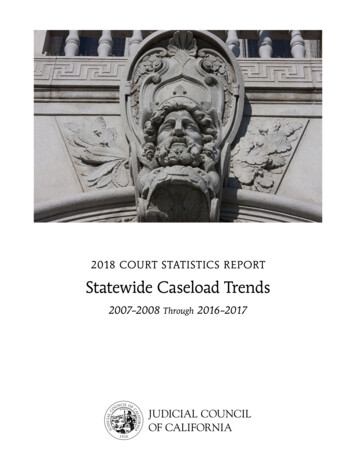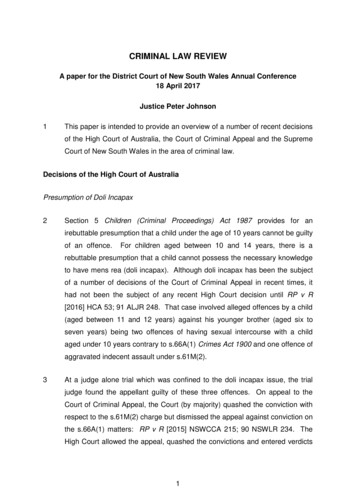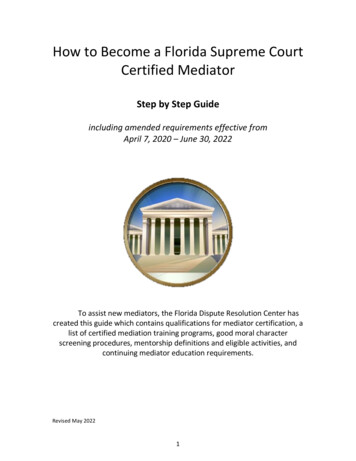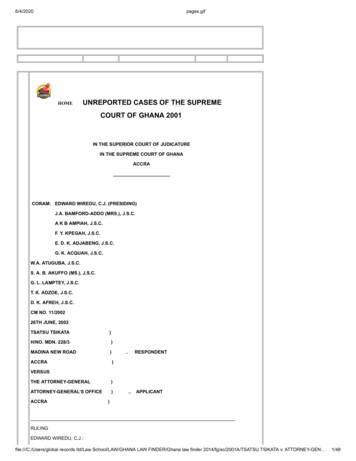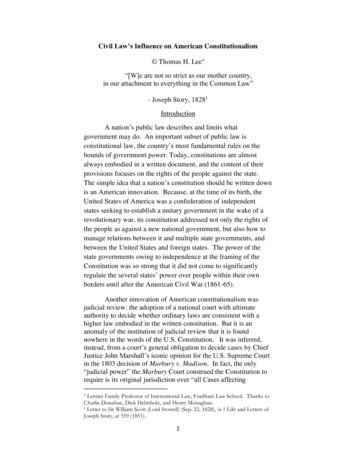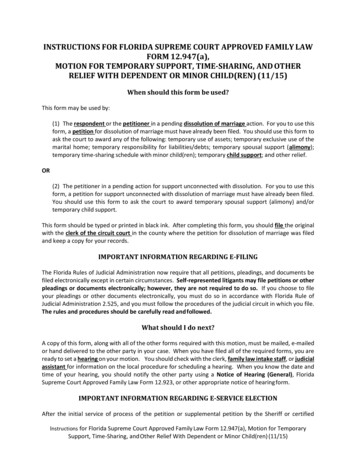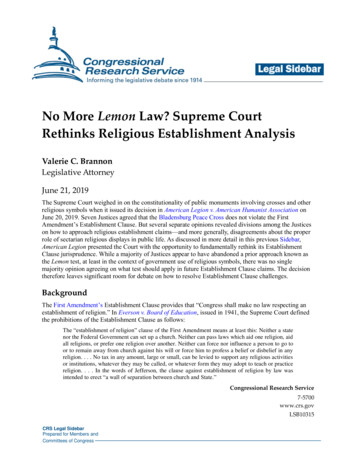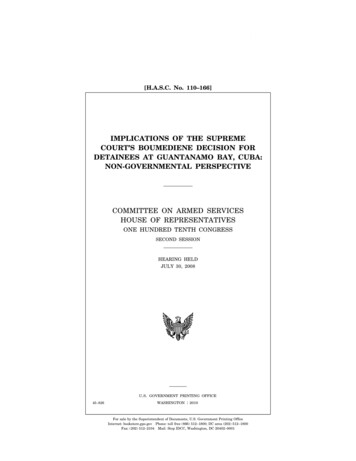
Transcription
i[H.A.S.C. No. 110–166]IMPLICATIONS OF THE SUPREMECOURT’S BOUMEDIENE DECISION FORDETAINEES AT GUANTANAMO BAY, CUBA:NON-GOVERNMENTAL PERSPECTIVECOMMITTEE ON ARMED SERVICESHOUSE OF REPRESENTATIVESONE HUNDRED TENTH CONGRESSSECOND SESSIONHEARING HELDJULY 30, 2008U.S. GOVERNMENT PRINTING OFFICE45–826WASHINGTON:2010For sale by the Superintendent of Documents, U.S. Government Printing OfficeInternet: bookstore.gpo.gov Phone: toll free (866) 512–1800; DC area (202) 512–1800Fax: (202) 512–2104 Mail: Stop IDCC, Washington, DC 20402–0001
HOUSE COMMITTEE ON ARMED SERVICESONE HUNDRED TENTH CONGRESSIKE SKELTON, Missouri, ChairmanJOHN SPRATT, South CarolinaDUNCAN HUNTER, CaliforniaSOLOMON P. ORTIZ, TexasJIM SAXTON, New JerseyGENE TAYLOR, MississippiJOHN M. MCHUGH, New YorkTERRY EVERETT, AlabamaNEIL ABERCROMBIE, HawaiiROSCOE G. BARTLETT, MarylandSILVESTRE REYES, TexasHOWARD P. ‘‘BUCK’’ MCKEON, CaliforniaVIC SNYDER, ArkansasMAC THORNBERRY, TexasADAM SMITH, WashingtonWALTER B. JONES, North CarolinaLORETTA SANCHEZ, CaliforniaROBIN HAYES, North CarolinaMIKE MCINTYRE, North CarolinaELLEN O. TAUSCHER, CaliforniaW. TODD AKIN, MissouriROBERT A. BRADY, PennsylvaniaJ. RANDY FORBES, VirginiaROBERT ANDREWS, New JerseyJEFF MILLER, FloridaSUSAN A. DAVIS, CaliforniaJOE WILSON, South CarolinaRICK LARSEN, WashingtonFRANK A. LOBIONDO, New JerseyTOM COLE, OklahomaJIM COOPER, TennesseeROB BISHOP, UtahJIM MARSHALL, GeorgiaMICHAEL TURNER, OhioMADELEINE Z. BORDALLO, GuamJOHN KLINE, MinnesotaMARK E. UDALL, ColoradoPHIL GINGREY, GeorgiaDAN BOREN, OklahomaMIKE ROGERS, AlabamaBRAD ELLSWORTH, IndianaTRENT FRANKS, ArizonaNANCY BOYDA, KansasBILL SHUSTER, PennsylvaniaPATRICK J. MURPHY, PennsylvaniaTHELMA DRAKE, VirginiaHANK JOHNSON, GeorgiaCATHY MCMORRIS RODGERS, WashingtonCAROL SHEA-PORTER, New HampshireK. MICHAEL CONAWAY, TexasJOE COURTNEY, ConnecticutGEOFF DAVIS, KentuckyDAVID LOEBSACK, IowaDOUG LAMBORN, ColoradoKIRSTEN E. GILLIBRAND, New YorkROB WITTMAN, VirginiaJOE SESTAK, PennsylvaniaGABRIELLE GIFFORDS, ArizonaNIKI TSONGAS, MassachusettsELIJAH E. CUMMINGS, MarylandKENDRICK B. MEEK, FloridaKATHY CASTOR, FloridaERIN C. CONATON, Staff DirectorPAUL OOSTBURG, Professional Staff MemberTHOMAS HAWLEY, Professional Staff MemberCATERINA DUTTO, Staff Assistant(II)
CONTENTSCHRONOLOGICAL LIST OF HEARINGS2008PageHEARING:Wednesday, July 30, 2008, Implications of the Supreme Court’s BoumedieneDecision for Detainees at Guantanamo Bay, Cuba: Non-Governmental Perspective .APPENDIX:Wednesday, July 30, 2008 .151WEDNESDAY, JULY 30, 2008IMPLICATIONS OF THE SUPREME COURT’S BOUMEDIENE DECISIONFOR DETAINEES AT GUANTANAMO BAY, CUBA: NON-GOVERNMENTAL PERSPECTIVESTATEMENTS PRESENTED BY MEMBERS OF CONGRESSHunter, Hon. Duncan, a Representative from California, Ranking Member,Committee on Armed Services .Skelton, Hon. Ike, a Representative from Missouri, Chairman, Committeeon Armed Services .31WITNESSESDavis, Col. Morris D., USAF, Former Chief Prosecutor, Office of MilitaryCommissions (2005–2007) .Katyal, Neal K., Paul and Patricia Saunders Professor of National SecurityLaw, Georgetown University Law Center .Klingler, Richard, Partner, Sidley Austin LLP .Oleskey, Stephen H., Partner, Wilmer Cutler Pickering Hale and Dorr LLP,Counsel for the Guantanamo Prisoners in Boumediene v. Bush .1410127APPENDIXPREPARED STATEMENTS:Davis, Col. Morris D. .Katyal, Neal K. .Klingler, Richard .Oleskey, Stephen H. .DOCUMENTS SUBMITTED FOR THE RECORD:[There were no Documents submitted.]WITNESS RESPONSES TO QUESTIONS ASKED DURING THE HEARING:[There were no Questions submitted during the hearing.]QUESTIONS SUBMITTED BY MEMBERS POST HEARING:[There were no Questions submitted post hearing.](III)102749155
IMPLICATIONS OF THE SUPREME COURT’S BOUMEDIENE DECISION FOR DETAINEES AT GUANTANAMOBAY, CUBA: NON-GOVERNMENTAL PERSPECTIVEHOUSE OF REPRESENTATIVES,COMMITTEE ON ARMED SERVICES,Washington, DC, Wednesday, July 30, 2008.The committee met, pursuant to call, at 10:04 a.m., in room2118, Rayburn House Office Building, Hon. Ike Skelton (chairmanof the committee) presiding.OPENING STATEMENT OF HON. IKE SKELTON, A REPRESENTATIVE FROM MISSOURI, CHAIRMAN, COMMITTEE ON ARMEDSERVICESThe CHAIRMAN. Our committee will come to order.Two hundred and twenty years ago, one of our founding fathers,Alexander Hamilton, warned that the imprisonment of individualsin distant or unknown locations without due process is a very dangerous engine of arbitrary government.To guard against the tendencies of such governments, Hamiltonadvocated for the centuries-old power of British courts to orderwardens to bring prisoners before it, so that a judge as a neutralthird party could inquire into the basis for continued detention.This is the power of habeas corpus, or what became known as the‘‘Great Writ.’’The Military Commissions Act (MCA) of 2006, which was enactedin the last Congress, stripped our federal courts of this bulwark ofour Constitution. As a result, the Administration received thegreen light to be jailer, judge, and jury, and it gladly revved its engine.The engine roared until the highest court in our land determinedthat the price of fuel for that engine was more than our Constitution could bear. Last month, the Supreme Court, in a five-to-fouropinion, decided that the detainees who were being held at the U.S.Navy station in Guantanamo Bay, Cuba, do have the habeas corpus privilege under the suspension clause of the Constitution andthat Section 7 of the Military Commissions Act is unconstitutional.As a former prosecutor, it is gratifying to know that the federalcourts will resume their traditional role of ensuring that only thecorrupt remain behind bars.While I still believe the current military commissions system hassome other significant weaknesses, this ruling of the court will helpby ensuring that any commission ruling which is designed to bringterrorists to justice can better withstand judicial scrutiny, for certain convictions must go hand-in-hand with tough prosecution.(1)
2In addition to the now largely addressed habeas issue, I have repeatedly identified six other potential unlawful defects in the current military commissions framework.First, the Military Commissions Act may violate the exceptionsclause under Article III of the Constitution by impermissibly restricting the Supreme Court’s review.Second, it is questionable whether the Supreme Court would uphold a system that purports to make the President the final arbiterof the Geneva Convention.Third, the provisions regarding coerced testimony may be challenged under our Constitution.Fourth, the act contains very lenient hearsay rules, which rub upagainst the right of the accused to confront witnesses in evidence,as guaranteed by the Constitution.Fifth, the act may be challenged on equal protection and otherconstitutional grounds for how it discriminates against the detainees for being aliens.Last, Article I of the Constitution prohibits ex-post-facto laws,and that is what this act may have created.Although I don’t anticipate that all of these issues will be resolved before high-value detainees, such as Khalid Sheikh Mohammed, self-confessed mastermind of 9/11, go to trial, I have confidence that the courts and we here in our Congress will be deliberate and decisive, rather than recklessly headstrong on how weapproach these very difficult questions. We must make sure thatthe verdicts of the military juries stick.I look forward to hearing from our witnesses today.We have as our witnesses in front of us Stephen Oleskey, a partner in Wilmer, Cutler, Pickering, Hale, and Dorr, and has represented six Bosnian Algerian men who have been detained atGuantanamo since 2002. Mr. Oleskey was awarded the 2007 American Bar Association Pro Bono Publico Award, largely because ofhis work on habeas corpus.Would you raise your hand? We will know who is who. There youare. Thank you very much.Next witness: Neal Katyal is a Saunders professional in nationalsecurity law at Georgetown University Law School. In Hamdan v.Rumsfeld, he successfully argued before the Supreme Court thatthe Military Commissions Act, which predated the Military Commissions Act, were unconstitutional.Would you raise your hand? Just want to thank you.Richard Klingler, who served as the National Security Council’sgeneral counsel and legal adviser from 2006 to 2007 and is a partner in the law firm of Sidley Austin.Thank you.Mr. Morris Davis, colonel in the United States Air Force, although he is testifying as a civilian while on terminal leave. Colonel Davis was formerly the chief prosecutor for the Office of Military Commissions.We certainly appreciate your being with us and giving us yourthoughts on this highly important issue.Ranking Member Duncan Hunter.
3STATEMENT OF HON. DUNCAN HUNTER, A REPRESENTATIVEFROM CALIFORNIA, RANKING MEMBER, COMMITTEE ONARMED SERVICESMr. HUNTER. Thank you, Mr. Chairman. And thanks for holdingthis important hearing.And I would simply note that Alexander Hamilton, however,never recommended that habeas be given to prisoners of war(POWs). In fact, the habeas rights that have been directed by thecourt’s decision are rights that terrorists have at this point, whichno American soldiers have.Over the last couple of years, this committee has spent a lot oftime focusing on our detainee policy for the global war on terrorism. And the policy that the committee advanced took into account that this war against terror has produced a new type of battlefield and a new type of enemy.In the last Congress, we worked hard to pass the Detainee Treatment Act (DTA) and the Military Commissions Act, MCA, ensuringthat the United States is able to detain, interrogate, and try terrorists.We had a practical problem that we had to address, this newtype of war that doesn’t involve particularly uniformed adversarieson the battlefield, but nonetheless very deadly adversaries. And wehad to do so in a manner that is consistent with the Constitutionand the international rules of war.As the attorney general recently remarked about the DTA andthe MCA, the Detainee Treatment Act and the Military Commissions Act, and he said, ‘‘These laws give more procedural protections than the United States or any other country, for that matter,had ever given to war-time captives, whether those captives werelawful soldiers in foreign armies or unlawful combatants who target civilians and hide in civilian populations.’’And, Mr. Chairman, I just asked the staff, as we kick this thingoff, to give me the list of procedural protections that we gave to accused terrorists when we put this bill together. Let me just go overthese because I think this is important.The right to counsel, none of our POWs have that. The presumption of innocence, POWs don’t have that. Proof beyond a reasonabledoubt, opportunity to obtain witnesses and other evidence, right todiscovery, exculpatory evidence provided to defense counsel.Statements obtained through torture are excluded. Classified evidence must be declassified, redacted or summarized to the maximum extent possible. Statements allegedly obtained through coercion are only admissible if the military judge rules that the statement is reliable and probative. A certified, impartial judge will preside over all proceedings of individual military commissions.The U.S. Government must provide defense counsel, includingcounsel with the necessary clearances to review classified information on the accused terrorists they have. In capital cases, the military commissions’ 12 panelists must unanimously agree on the verdict, and the President has a final review.Panel votes are secret ballot, which ensures panelists are allowedto vote their own conscience. Right to appeal to a new military—a new court, a military commissions review, and the Court of Ap-
4peals for the District of Columbia, and the right against doublejeopardy.Those, gentlemen, were derived from our scrutiny of other councils that were similar, tribunals, including Nuremberg, Rwanda,and others. And I think you could accurately say that we actuallygave more rights to accused terrorists than any councils, any tribunals ever assembled.If you have got some others that give more rights to accused terrorists, I would like to hear about it. And if you don’t think thatlist of rights is long enough, I would like to know what you thinkwe should—what additional rights we should give.And once again, the right to habeas is a right that no Americansoldier enjoys.This is a delicate and carefully balanced framework, agreed to bythe large majorities in both Houses of Congress, and it was throwninto question as a result of the recent Supreme Court decision inBoumediene. And in a deeply divided opinion, a five-to-four majority made the unprecedented decision to afford a constitutional rightof habeas corpus on alien enemies detained abroad by our militaryforces in the course of an ongoing war.And while I disagree with the court’s opinion, the decision is nowthe law of the land. The challenge before the committee today isclarifying the implications of the Supreme Court decision.Though some of our panelists today advance the argument thatthe Supreme Court decision suggests other constitutional infirmities with the Military Commissions Act that warrant congressional action, I continue to believe that absent an explicit decisionby the court that the commissions process is unconstitutional, thetrials should go forward without congressional interference.It is important to note that the majority in Boumediene addressed the process for status determinations regarding detention.The court was silent with respect to commissions.Currently there are 20 commissions in the works, and the firsttrial has just commenced. Under the MCA, each of the accused willhave the right to appeal a guilty verdict to the Court of MilitaryCommission Review, to the Court of Appeals for the D.C. court circuit, and then to the Supreme Court.I encourage the committee to heed the underlying principle ofChief Justice Roberts’ dissent in Boumediene: ‘‘We should not rushto judgment on the constitutionality of the commissions until theprocess is complete and the trials have exhausted their reviews.’’As we meet today, the case against the 9/11 conspirators is moving forward. As the Congress intended, the U.S. is in the processof bringing those responsible for the attacks on the World TradeCenter and the Pentagon to justice. Congress should exercise discretion.While Boumediene did not reach the issue of military commissions directly, it did raise a host of issues related to the process required to detain an individual the military believes to be a terrorist.Moreover, the basis for which the court determined that detainees in Guantanamo have a constitutional right raises questions asto whether the court’s rationale could extend to other places wherethe military holds detainees, like Iraq and Afghanistan.
5I share Justice Scalia’s concern that, absent congressional action,the policy for handling enemy prisoners in this war will ultimatelylie with the branch that knows the least about the national security concerns the subject entails. I believe these are matters bestleft to political branches to decide.So what policy matters are put into question by Boumediene thatshould not be left to the court to decide? Attorney GeneralMukasey’s recent speech on the subject highlights six critical areasthat need congressional action.First and most important, Congress should make clear that afederal court may not order the government to bring enemy combatants into the United States. Even under the current system, wehave released detainees that have resurfaced on the battlefield andengaged in armed conflict.I share Justice Scalia’s concern that, post-Boumediene, the number of enemy returned to combat will increase. And I remind mycolleagues that we have had a number of people who were releasedfrom Guantanamo who showed up on the battlefield again, attempting to kill American soldiers.Second, it is imperative that the proceedings for these enemycombatants be conducted in a way that protects how our Nationgathers intelligence and what that intelligence is.Attorney General Mukasey cites a terrorism case he presidedover when he sat on the federal bench where the government wasrequired by law to hand over to the defense a list of unindicted coconspirators. This list found its way through the lawyers to Osamabin Laden in Khartoum.Third, Congress should make clear that habeas proceedingsshould not delay the military commission trials of detaineescharged with war crimes. Fortunately, one federal judge has already ruled on this matter, deciding that the trial should go forward, but this question is still at issue. The victims of September11th should not have to wait any longer to see those who stand accused face trial. That is what he said.Fourth, Congress should re-affirm that, for the duration of theconflict, the United States may detain as enemy combatants thosewho have engaged in hostilities or purposefully supported alQaeda, the Taliban, and associated organizations. Large majoritiesof this Congress support supplemental spending bills that pay forthe war and allow for the continued fight against al Qaeda, yetthere are judges who question whether there is still authorizationto detain. We should put any doubt to rest.Fifth, Congress should ensure that one district court takes exclusive jurisdiction over these habeas cases and should direct thatcommon legal issues be decided by one judge in a coordinated fashion. It is simply absurd to have the rules of the game change fromone detainee’s case to the next.Last, Congress should make clear that the detainees cannot pursue other forms of litigation to challenge their detention. Simplyput, detainees should not have two bites at the apple. Now thatthey will receive habeas review, there is no reason for the D.C. circuit to review status determinations also.At stake here is whether this Congress and this committee inparticular will allow the slow creep of lawfare to replace warfare.
6Our men and women in uniform are trained in armed conflict. Thebattlefield is not a place for a crime scene investigative unit.And I can recall, Mr. Chairman, when we had one of our hearings on the proposed Detainee Treatment Act and we asked one ofour very experienced litigators, one of our lawyers, in-service lawyers who understood the Uniform Code of Military Justice (UCMJ),and a number of people were saying, ‘‘Let us apply the UCMJ todetainees on the battlefield.’’And we asked that particular attorney whether that would meanthat when a Marine squad saw a terrorist shoot at him on the battlefield in Afghanistan, he would then have to give him his Miranda rights, as he interrogated him at the Humvee. And the answer was, in that lawyer’s opinion, yes, he would have to do that,leading to the question of whether we were going to be able to assign lawyers to each squad of Marine combatants.So I think this is an issue that we should look at very clearlyfrom the perspective of people on the battlefield.As the attorney general recently argued, military personnelshould not be required to risk their lives to create the sort of arrestreports and chain-of-custody reports that are used under very different circumstances by ordinary law enforcement officers in theUnited States. Battlefields are not an environment where such reports can be generated without substantial risk to American lives.Finally, Mr. Chairman, it is the battlefield that this committeeneeds to keep in mind here. We are the Armed Services Committee.We protect members of the Armed Services and try to make surewe have policies that allow them to execute their very difficult mission with a modicum of safety.My greatest concern, in light of this recent Supreme Court decision, is its potential effect on operations in Iraq and Afghanistan.We detain thousands of detainees in Iraq and hundreds in Afghanistan. Detention is a fundamental component of warfare. It keepscombatants off the battlefield and provides actionable intelligence.We can’t hamper our warfighters by providing them with theperilous choice of releasing detainees or complying with process requirements of the criminal justice system that are impossible tocomply with on the battlefield.In the past, I would have thought such a concern was remote,bordering on paranoia. However, as we meet today, detainees in Afghanistan have filed petitions for habeas relief in U.S. courts.As one editorialist recently pointed out, the Supreme Court rejected the concept that court jurisdiction is limited to sovereignAmerican territory and could extend not just to captives at Guantanamo, but all detainees abroad. And I think this is simply untenable.So, Mr. Chairman, thank you for holding this very importanthearing today. I look forward to the testimony of our witnesses.The CHAIRMAN. I thank the gentleman.We are extremely fortunate to have the witnesses we have onthis panel. And we look forward to hearing from you. I hope I don’tmispronounce your name as I call on it, but let me try.Stephen Oleskey, did I get it? All right. Get the——Mr. OLESKEY. Yes, you did, Mr. Chairman. Thank you.
7The CHAIRMAN. Okay. With that, we will call on you first, so wehope you will summarize your testimony. We on the committee aregoverned, as you know, by the five-minute rule, and we will proceed.STATEMENT OF STEPHEN H. OLESKEY, PARTNER, WILMERCUTLER PICKERING HALE AND DORR LLP, COUNSEL FORTHE GUANTANAMO PRISONERS IN BOUMEDIENE V. BUSHMr. OLESKEY. Thank you, Mr. Chairman, Ranking Member Hunter, members of the committee.I have been since July 2004 co-lead counsel in the case which theSupreme Court decided on June 12th, Boumediene against Bush.My clients, as the chairman mentioned, were arrested at the behestof the United States in Bosnia in the fall of 2001, despite the factthat the Bosnians had no evidence——The CHAIRMAN. Could you get just a little closer to the microphone?Mr. OLESKEY [continuing]. Despite the fact that the Bosnianshad no evidence to arrest them, were investigated thoroughly bythe Bosnia system, with the cooperation of the United States, andthen ordered released in January 2002.However, instead of being released, they were turned over againat the demand of the United States to our forces there and flownto Guantanamo, where they have been since January 20, 2002. Sothey are now completing six and a half years in Guantanamo without charge or a hearing.Our case was originally dismissed in January of 2002. Anotherparallel case was ordered to go forward. Both cases then went upthrough the appellate system. While that was happening, this Congress—the previous Congresses passed first the Detainee Treatment Act of 2005 and then the Military Commissions Act of 2006,both of which you have referred to in your opening remarks.Then, in 2006, the Supreme Court held in the Hamdan case thathabeas had not been stripped or taken away by the Detainee Treatment Act and habeas could go forward.Thereafter, the Congress passed the Military Commissions Act,which dealt both with military commissions and with the status ofhabeas corpus for the detainees in Guantanamo who had beencharacterized as enemy combatants. And that law appeared to sayon its face that there could be no habeas corpus rights to be pursued by men designated as enemy combatants through the militaryCombat Status Review Tribunal, or CSRT, a design which was established in 2004.Our clients and others then challenged that habeas-strippingprovision both in the circuit court and in the court of the—and inthe United States Supreme Court, resulting in the Boumediene decision of June 12th.That decision holds for the first time that Congress has unlawfully suspended the writ of habeas corpus provided in Article I,Clause 9 of the Constitution, because, in the circumstances existingin Guantanamo, the court found that habeas rights ran there andcould be invoked by those prisoners, a decision that was foreshadowed in the Rasul and Hamdi decisions of 2004, also by theSupreme Court.
8Now, the suspension clause states that the privilege of the writof habeas corpus may not be suspended, except when in times ofrebellion or invasion the public safety may require it. That is bedrock. It is in the body of the Constitution. It was so important tothe Founders that they didn’t wait for a Bill of Rights. They putit as a limitation on the power of the Executive and of the Congressright in the body of the Constitution.The Supreme Court then found in Boumediene that prisonerscould claim habeas corpus despite the fact that the Cuban government retains legal sovereignty over the United States’ base therebecause the United States has had total control and jurisdictionover that 45-mile enclave since the lease of 1903 under which weobtained the right in perpetuity to hold that base as a military facility for the United States.The Supreme Court also found that the prisoners’ alien or foreignstatus was not a part of their invoking habeas corpus in the context of Guantanamo, in view of the Framers’ intent in enshrininghabeas corpus in the body of the Constitution and the SupremeCourt’s history of construing some fundamental constitutionalrights as applying outside the United States, depending on particular facts and circumstances, that is a history that goes backover 100 years.Since there was no congressional finding in these cases of rebellion or invasion, the Supreme Court concluded there was no lawfulbasis for Congress to suspend habeas corpus for the approximately275 men remaining in Guantanamo.Then the court examined whether the statutes that you enacted,particularly the Detainee Treatment Act and the habeas-strippingprovision of the Military Commissions Act of 2006, together providean adequate substitute or an acceptable remedy for habeas, whichit found had been stripped.The court found that these congressional remedies were not adequate substitutes because the underlying process in Guantanamo,unlike a trial in federal court, a criminal trial or another adversarial proceeding, was fundamentally not adversarial. There wasno evidence, no classified evidence made available to anyone thereto defend himself. No one had lawyers. They had limited ability tocall witnesses and offer documents. And the government evidencewas presumed valid.The only review that Congress allowed of this was a limited review, an administrative review, essentially, a record review by theCourt of Appeals in Washington, which could not make new factfinding, unless a federal habeas court, which could not go beyondthe record from Guantanamo, which was this extremely non-adversarial record that resulted from a process created by the DefenseDepartment in 2004.In effect, this Court of Appeals would be reviewing a baked-inrecord with many procedural deficiencies that the court foundwould not begin to provide anything approximating fair or dueprocess. For example, there would be no ability to challenge thelegal authorization for detention, which the Administration has always asserted is found in the Authorization for Use of MilitaryForce resolution of Congress in September of 2001.
9There is no authority in the district court to order conditional release of any prisoner found to be entitled to the grant of habeascorpus. A federal district court can order a conditional release. Isay that release is conditional because that is the word the Supreme Court used.And what the court was saying was that, even if someone has ordered release, it is still up to the political branches—in this case,the Executive—to negotiate their return to the country from whichthey were taken or to some other country which is willing to takethem.And as the committee may be aware, there are a number of menwho the Defense Department itself has cleared, has said are notenemy combatants or are no longer enemy combatants, who areawaiting in Guantanamo for some country to be willing to takethem.The United States has said properly that no one would be sentback at this time to a country where they will be tortured or mistreated, for example, the Chinese Uyghurs we are not willing to return to China for that reason. So they are actually being held,many of them, as cleared men, but with no place to go.So those are the deficiencies that the Supreme Court found inthe existing process and why it found that the circuit court processfor limited review that Congress enacted was not sufficient in viewof the constitutional entitlement of these men to some fair process.It is correct that the Supreme Court left various details abouthow the habeas trials would be conducted to the federal districtcourt in Washington, right down the street in the PrettymanCourthouse, but this result that experienced Article III federaljudges, sitting in the trial court, will now do their jobs and conducthabeas trials is unremarkable and scarcely a justification, let aloneone rising to a necessity, for additional congressional action withrespect to habeas corpus at this
First, the Military Commissions Act may violate the exceptions clause under Article III of the Constitution by impermissibly re-stricting the Supreme Court's review. Second, it is questionable whether the Supreme Court would up-hold a system that purports to make the President the final arbiter of the Geneva Convention.


